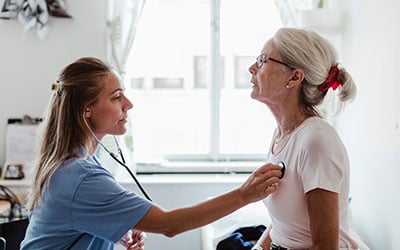

Color Code: #ffffff
How much do you know about women’s health? Test your knowledge, and then scroll down to learn more about women’s health.
Color Code: #ffffff
WOMEN'S HEALTH CENTER

Your Health Matters
Women make 80 percent of healthcare decisions for their households. They’re caretakers for their children, for their partners and, often, for their parents. But the results of our Women’s Health IQ Quiz show that there’s a concerning knowledge gap that hinders women from seeking and receiving the care that they need.
That’s why we built this Women’s Health Center — as a resource to help women overcome some of the barriers they face when it comes to health. If you haven’t taken our quiz, click here to get started.
If you have already taken the quiz, we encourage you to spend some time learning about what puts women’s health at risk.
Women's Health Quiz
Color Code: #f7f7f7
What We Learned
 We interviewed more than 1,400 women across the U.S. in our Women’s Health MDVIP/Ipsos survey, which not only included our Women's Health Quiz, but also a number of questions about their personal health and healthcare experiences. The findings were revealing. For example, we learned:
We interviewed more than 1,400 women across the U.S. in our Women’s Health MDVIP/Ipsos survey, which not only included our Women's Health Quiz, but also a number of questions about their personal health and healthcare experiences. The findings were revealing. For example, we learned:
- 8 in 10 women report barriers that prevent them from taking better care of their health
- Most women are in the dark about the top health issues affecting them, with 9 out of 10 failing the Women’s Health IQ quiz
- Women rank PCPs as the most important resource for their healthcare, but they say they aren’t getting adequate time or attention from their doctor
- Younger women (ages 20-34) are much less engaged and more dissatisfied with their healthcare
- COVID-19 currently ranks as the biggest health concern for women, having a negative impact on both their physical and mental health
Some of these outcomes are already well known -- studies show that many women are frustrated with their primary care interactions, for example. But other discoveries were new, including the lack of knowledge about basic women's health issues. Most women, for example, don't know that heart disease is the number one cause of death among women or that lung cancer kills more women than breast cancer.
These gaps in knowledge are important, especially when coupled with barriers to healthcare for women. Read on to help close this gap and find out how to overcome some common barriers women face in primary care.
>> Read the Press Release
>> By the Numbers: See Our Women's Health Infographic
What You Should Know About Women’s Health
 When it comes to women’s health, myths pervade. Women worry more about breast cancer, for example, than heart disease, even though the latter will kill seven times as many women this year. Other conditions, like dementia and osteoporosis, which have an outsized impact on women, are often preventable with changes in exercise, diet and other lifestyle factors.
When it comes to women’s health, myths pervade. Women worry more about breast cancer, for example, than heart disease, even though the latter will kill seven times as many women this year. Other conditions, like dementia and osteoporosis, which have an outsized impact on women, are often preventable with changes in exercise, diet and other lifestyle factors.
Myth 1: Breast cancer is the biggest issue in women’s health.
Fact: Lung cancer and heart disease in women is more deadly than breast cancer. While breast cancer is important, most cases of heart disease are preventable.
Heart disease can also be more deadly for women than men – women often think of heart disease as a man’s disease and fail to recognize symptoms and risk factors. Studies have also shown that physicians can miss obvious symptoms and fail to treat women as aggressively for heart disease as men. Women are less likely to be prescribed certain heart medications (aspirin, statins and blood pressure meds) than men, according to a 2020 study in the Journal of the American Heart Association.
Nowhere is this discrepancy bigger than with a heart attack. Women often present with the same chest pain symptoms as men, but they also can present with pain or discomfort in the jaw, neck, arms or between the shoulder blades. Patients and doctors are quick to dismiss both as something other than heart attack 50 percent of the time, according to one study from 2018. They dismiss it as heartburn or stress and anxiety-related.
Still, an estimated 80 percent of heart disease is preventable. Learn what you can do to reduce your risk for cardiovascular disease.
Myth 2: There’s nothing I can do to lower my cancer risk.
 Fact: While it’s true that certain genetic factors play a big role in cancer risk — especially the BRCA 1 and BRCA 2 genes for breast and ovarian cancer — you can lower your risk of most cancers through changes in lifestyle – and that includes breast cancer.
Fact: While it’s true that certain genetic factors play a big role in cancer risk — especially the BRCA 1 and BRCA 2 genes for breast and ovarian cancer — you can lower your risk of most cancers through changes in lifestyle – and that includes breast cancer.
If you don’t smoke, limit alcohol consumption, adopt a healthy diet and maintain a healthy weight, you can lower your risk substantially. Smoking remains the number one risk factor for lung cancer, for example, and lung cancer kills more women than breast cancer.
Talk to your primary care doctor about your cancer risk and develop a plan to lower it. Here are some other things you can do to lower your chances of getting cancer.
Myth 3: Osteoporosis is just a normal part of aging.
Fact: Osteoporosis and the fractures and debilitating broken bones that come with it are not a normal part of anything. And it’s largely preventable.
Osteoporosis is a condition in which the bones have become so weak and brittle, they’re vulnerable to fractures. Bones of the spine, hip and wrist have the higher risk of breaking. And breaking a hip in your senior years can be life-threatening, as the bedrest required to heal a broken hip raises the risk for pneumonia and blood clots.
Osteoporosis affects more women than men — and affects mostly older women. Prevention starts when you’re young, but no matter how old you are, you can take steps to build bone mass and prevent loss. Here’s how.
Myth 4: Pap smears screen for more than just cervical cancer.
Fact: Pap smears only screen for cervical cancer. Ovarian and endometrial cancers are usually detected by biopsy once symptoms develop. The good news is that testing for cervical cancer has caused the number of deaths to decrease significantly. There’s also a vaccine for cervical cancer, which is caused by a strain of HPV.
But other gynecological cancers defy easy detection. That’s why it’s important to see your doctor regularly and share with them any unusual symptoms, including:
- Abdominal bloating or swelling
- Unexplained weight loss
- Feeling full when eating
- Discomfort in your pelvis area
- Changes in bowel habits, like constipation
- Frequent need to urinate
- Abnormal vaginal bleeding
- Vaginal discharge
- Painful urination
Learn more about common screening tests for women and when you should get one.
Myth 5: Skipping or delaying my primary care appointment is okay.
 Fact: Modern primary care can be a pain. Long waits for short appointments are the norm, unfortunately. But your primary care doctor is still important. And skipping annual screenings or wellness visits can allow little problems to become big ones.
Fact: Modern primary care can be a pain. Long waits for short appointments are the norm, unfortunately. But your primary care doctor is still important. And skipping annual screenings or wellness visits can allow little problems to become big ones.
In our Women’s Health Survey, more than half of women said they waited longer than they’d like to get a doctor’s appointment; 55 percent put off seeing the doctor until their symptoms became urgent; 44 percent have skipped the doctor or delayed seeing him or her due to busy schedules; and 60 percent ended up seeing a physician’s assistant or nurse practitioner instead of their doctor.
While longer waits at the doctor are frustrating inconveniences, even worse are women who told us they wished their doctor spent more time on issues relevant to them (36 percent), said their concerns weren’t taken seriously by their doctor (31 percent) and said they couldn’t’ ask all their questions in an appointment (31%).
Modern primary care doctors are busy and often have only a short amount of time to meet with you. They can also be distracted by technology, electronic charting and other patients. Here are three tips you should follow to be heard by your doctor:
- Prepare for your appointment. Have a list of symptoms and questions ready for your doctor.
- Speak up if you disagree. If you describe your problem to your doctor and you feel it’s dismissed, speak up.
- Review the appointment. After you are finished, think about the appointment. If you felt your concerns weren’t addressed, get a second opinion from another doctor or switch doctors altogether.
Finally, consider switching to a different kind of primary care altogether. MDVIP-affiliated physicians see fewer patients and offer longer appointments. They have more time to work with you on specific challenges and more time to listen to you and answer your questions.
Plus, you’ll take part annually in the MDVIP Wellness Program, which includes advanced screenings and tests not usually covered by insurance or Medicare. You’ll also enjoy same- or next-day appointments that start on time and last as long as needed. Fill out the form below and find a primary care doctor near you who has time to help you.